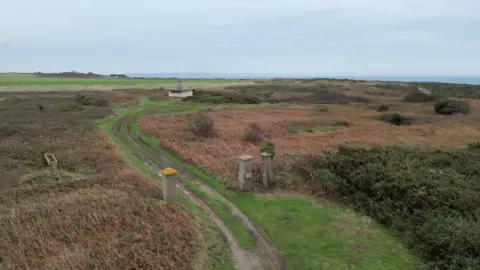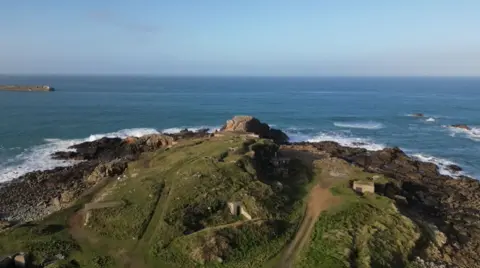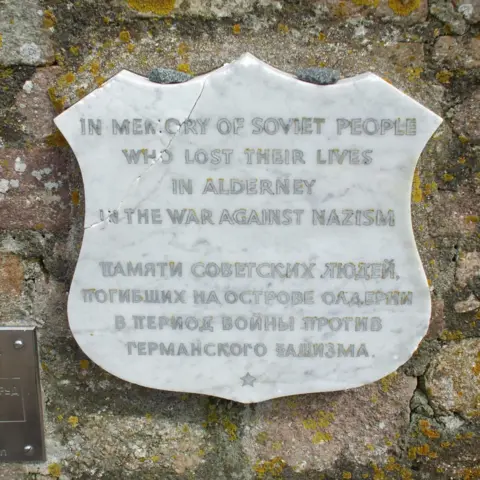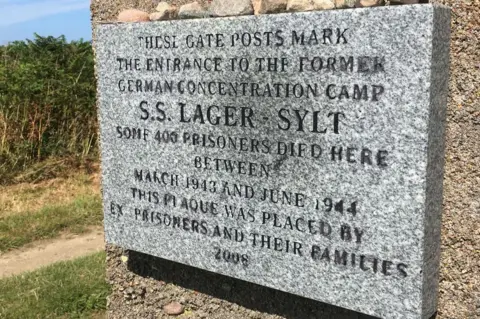Charlotte Cox,Ben Chapple
 BBC
BBCA “succession of cover-ups” meant nobody was brought to justice for the deaths of hundreds of people in Nazi camps on the British island of Alderney, a panel of experts has found.
The inquiry ordered by Lord Pickles found it likely 641-1,027 people died under the “brutality, sadism and murder” of Nazi rule on the northernmost of the inhabited Channel Islands.
It found the Holocaust was “part of Alderney’s history”, while Lord Pickles said the subsequent lack of war trials was a “stain on the reputations of successive British governments”.
The panel found this lack of justice was “intimately linked” to the prisoner-of-war breakout in Stalag Luft III – known as the Great Escape.
While a definitive list of names of those who died in Alderney was “impossible to achieve”, experts said they have created a “master database”.
Experts found “detailed information” about the transport of labourers under the control of the SS.
Lord Pickles said the report was the “most comprehensive look by experts on the numbers, conditions and individuals” on the island during the occupation.
Experts had used “a wealth of archival information”, he said, some of which was “hiding in plain sight”.
But he also warned against “distortion” of the truth, adding: “What happened on Alderney was bad enough with its brutality, sadism and murder, without the need for embellishment.”

“Alderney housed the most westerly concentration camp in the Third Reich,” said Lord Pickles.
“Prisoners were treated appallingly, and life was cheap, but Alderney did not house a ‘mini-Auschwitz’; there was no extermination centre on the island.
“Anyone who claims so has never visited Auschwitz or understood the extent of the Nazi’s death factories in Eastern Europe.”
He said he was “surprised” by the findings of Prof Anthony Glees, a special advisor to the panel who was tasked with looking into the lack of war crimes trials.
“Professor Glees found not one but a succession of cover-ups,” he added.
Prof Glees said the efforts of post-war investigators were “wholly serious in intent” – but the case was handed to the Soviet Union because the majority of victims were Soviet citizens.
Prof Glees said the British were motivated by “getting their hands” on the Germans who murdered British servicemen who had taken part in the Great Escape from Stalag Luft III.
He found the Soviet Union decided “to do nothing with the evidence” relating to Alderney.
The inquiry recognised additional documents “may exist in Russian archives” that it could not consult.
Prof Glees said the Soviet Union was “thus responsible for the failure to bring the perpetrators to justice, causing much anger among members of the British government”.
He said it was “scarcely understandable” that Britain declined to try Nazi war criminals for “appalling atrocities” on British soil.
He said the “cover-up” did not relate to a “lack of fervour” on the part of the British to convict Nazi war criminals – rather that it had handed the file to the USSR, which “did nothing with it”.
Prof Glees has called on the UK Government to apologise over the cover up.
At the launch of the findings at the Imperial War Museum on Wednesday, Prof Glees emphasised there was “no policy of turning a blind eye to murder” in the British government.
The UK’s Department for Levelling Up, Housing & Communities said: “A full and honest account of what happened on the Nazi occupied island of Alderney will provide dignity and justice for those who suffered and died – and ensure we never forget.”
The BBC has approached the Russian government for comment.
The inquiry’s findings
- At least 7,608 prisoners/labourers were sent to Alderney during the occupation
- Between 641 and 1,027 prisoners likely died, with future evidence unlikely to take the figure over 1,134
- At least 97 people died and one disappeared “in transit” to and from the island
- There is no evidence many thousands of victims died
- There are detailed lists of the names of many of those who died
- The figure is not expected to increase by more than a few hundred, even if new records are found
- At least one mass grave likely existed within the Longy Common cemetery
 Gilly Carr
Gilly CarrDuring World War Two, the Channel Islands were occupied by Germany and in Alderney, four forced labour camps were built, with one turned into a concentration camp.
Forced labourers “of 30 nationalities” were made to build strong concrete fortifications – fulfilling Hitler’s vision of forming “staging posts” to invade Britain, as well as the Atlantic wall aimed at defending the coastline of Europe from Norway to the Spanish border.
Work was carried out by the Organisation Todt (OT), made up of largely forced foreign labourers – majority of whom, according to experts, were from Europe or North Africa.
Other nationalities included Russian, Ukrainian, Polish, French, Spanish, German, Belgian, Dutch, British and Italians, among others.
The report includes “detailed information” about convoys of Jews deported from France and the number of Spaniards, Channel Islanders, German political prisoners, as well as French, Belgians and North Africans sent to Alderney.
The panel found there were more than 3,200 German military personnel and staff and 5,800 foreign workers in the island at the height of operations between August and October 1943.
Some women would also have worked there, most of whom were “young and massively outnumbered by men”, with “sexual assaults and abuse” likely, the review said.
Survivors of the camps reported “beatings and torture”, with “dead bodies often found in the barracks”.
The experts found conditions were “criminal and brutal” – but that the camps were not guided by the principle of “extermination through labour”.
Prisoners in Lager Sylt, the camp taken over by the SS in 1943, were “constantly terrorised”, they said.
After the island’s liberation in 1945, British military investigator Capt Theodore Pantcheff investigated what had happened during the German occupation.
His report, described in the review document as “painstakingly thorough”, led to an official figure of 389 people having died in the camps.
But for decades there have been suggestions the number was much higher with some suggesting it could run in the tens of thousands.
In 2023, the Alderney Expert Review Panel was tasked with finding an accurate figure and investigating why no UK war crime trials were held.

Because most of Alderney’s 1,500-strong population was evacuated before the German occupation, historical accounts as to the number of deaths varied wildly.
Lord Pickles said this had led to “an assumption by the unscrupulous and the careless that Alderney was a plain canvas on which any fantasy could be painted.”
He added: “Claims of mass murder that anywhere else would be checked carefully have been accepted at face value.
“Many murdered victims of the Nazis have no certain burial site, some are in places yet to be found, but we now have many of their names.”
The review found three cemeteries were used to bury labourers who died and these were Longy Common cemetery, St Anne cemetery and the German military cemetery.
Panel chairman Dr Paul Sanders said the inquiry had assembled a team of experts from several countries and disciplines: “They were able to develop synergies on a scale and level that is unlikely to be repeated again.
“I am proud to have been part of this unique endeavour.”
In their concluding remarks the panel members said Alderney residents and their government had “preserved the difficult wartime past of the island” and they hoped the community would consider the report “both as a sincere tribute and as a useful contribution to their multi-generational effort”.
William Tate, President of the States of Alderney, expressed deep gratitude to the panel for their dedication.
“The review makes clear what terrible conditions the people who had been brought to the island had to endure and how cheap their lives were to the occupying forces,” he said.
“The brave islanders who returned home in 1945, having been evacuated in 1940, saw first-hand the devastation that had been wrought upon their island home.
“As a community, we will never forget the suffering that these poor souls endured and the tragic loss of life, resulting from the callous and inhumane behaviour of the occupying forces.”
Karen Pollock CBE, chief executive of the Holocaust Educational Trust, said the review’s findings were “definitive” and commended the professionalism and expertise with which the work was carried out.
She said: “We hope that the review’s publication will raise public awareness of the terrible crimes committed by the Nazis on British soil and ensure that the victims are properly remembered.”
Lord Pickles said the report would pave the way to “accurately remember” the individuals who so tragically suffered and died on British soil.

